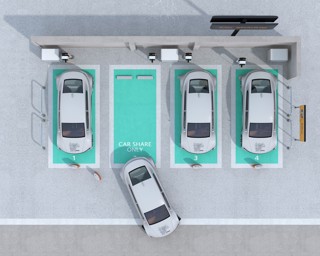New mobility alternatives are failing to make a significant dent in the appeal of company cars, new research from Arval suggests.
Fewer than one in five UK businesses (18%) believe their employees would give up their company car for any of a range of other options, including a mobility budget, car sharing, ride sharing or a mid-term rental arrangement.
The research, from the Arval Mobility Observatory, comes as leasing companies report a surge in interest in electric vehicles (EVs), thanks to a benefit-in-kind (BIK) tax rate of zero percent for battery electric vehicles (BEVs) in 2020/21.
Shaun Sadlier, head of Arval Mobility Observatory in the UK, said: “At a time when the company car is undoubtedly changing, perhaps more than at any other time in living memory thanks to the arrival of new forms of power, these results show how resilient it remains within UK corporate culture.
“The reasons for this are simple – the company car is an extremely time-efficient and cost-effective means of transport as well as being a strong employee benefit. Mobility solutions will need to match or exceed these advantages if they are to compete in the market.”
Sadlier explained that even among respondents who thought that their drivers would give up their company vehicle, most of the alternatives chosen often represented an alternative method of car provision – which is even more prevalent post-Covid-19.
New, separate research is showing how a loss of confidence in public transport looks set to change how employees will travel to work as the Covid-19 pandemic lockdown eases.
A survey by private hire company Addison Lee has found six out of 10 London commuters will change the way they travel when the return to work begins after lockdown.
Meanwhile, recruiter Robert Walters discovered 34% of UK employers surveyed are considering changing working hours to avoid busy commuting periods.
Sadlier said: “If you look deeper into our research, the attachment to the car is even more marked.
“Among drivers who would give up their vehicle, the vast majority of the alternatives they would consider are arguably different methods of accessing a car using company money, from finance schemes such as private leasing or salary sacrifice, to medium-term rental.”
In fact, looking at the figures in that light, just one in 20 fleet managers report that their drivers would give up their company car for a non-car solution – a mobility budget – and even that may ultimately be spent on a car.
“What this shows,” says Sadlier, “is the degree to which business thinking when it comes to mobility is about reframing their relationship to the car and using other options alongside it, rather than a wholesale adoption of alternatives.”
He concluded: “As well as being an efficient and effective means of business transport, a company car is a very easy means of ownership, with everything effectively taken care of for the employee, who can also benefit from more regular access to new technology.
“This is why it remains such a popular benefit, whether it’s an essential component of a job or as an employment perk.”
























Login to comment
Comments
No comments have been made yet.